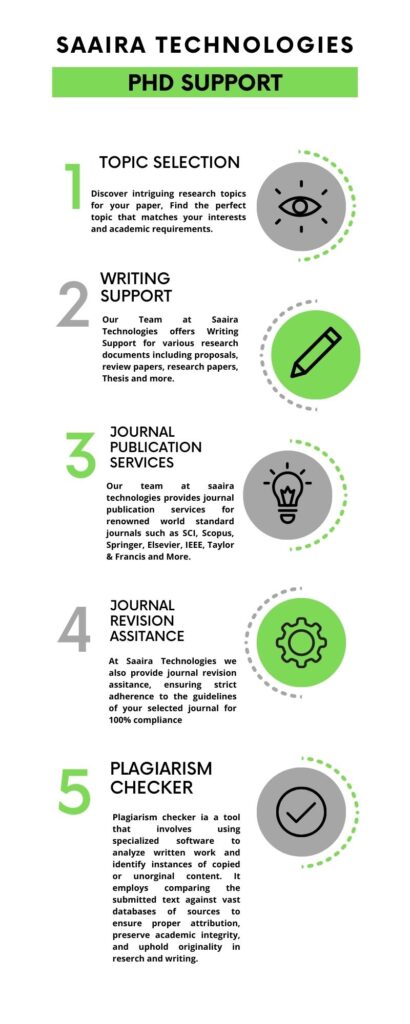PhD Help
PhD Help provides personalized support and guidance to doctoral students throughout the entire PhD program, from course selection to dissertation writing and defense. We provide expert advice and assistance in the areas of research, writing, time management, and career planning.

Embarking on a PhD journey can be both exhilarating and daunting. As a doctoral student, you are about to immerse yourself in a world of research, innovation, and intellectual exploration. However, the path to a successful PhD can be filled with challenges and uncertainties. That is why we are here to unlock the secrets to successful PhD research. In this comprehensive guide, we have gathered expert tips and guidance from seasoned academics and researchers to help you navigate this transformative journey with confidence and achieve outstanding results.
From choosing the right research topic to developing a solid research proposal, conducting rigorous literature reviews, and mastering the art of academic writing, we delve into every aspect of PhD research to provide you with practical advice, actionable strategies, and valuable insights. Whether you are just starting your PhD or are already in the midst of it, this guide will serve as your indispensable companion, equipping you with the knowledge and tools you need to excel in your research endeavors. Get ready to unlock the secrets and embark on a fulfilling and successful PhD research journey.
Understanding the Importance of Successful PhD Research
Research is the lifeblood of academia. It fuels innovation, contributes to the advancement of knowledge, and makes a lasting impact on society. As a PhD student, your research is not only a requirement for obtaining your degree but also an opportunity to make a meaningful contribution to your field. Understanding the importance of successful PhD research is crucial for setting the right foundation and mindset for your journey.
Successful PhD research goes beyond merely producing a dissertation. It involves pushing the boundaries of knowledge, challenging existing frameworks, and bringing fresh perspectives to the table. Your research should address a significant gap in the literature, provide novel insights, and potentially open new avenues for further exploration. By conducting rigorous and impactful research, you not only contribute to the academic community but also position yourself as an expert in your field, paving the way for future career opportunities.
To ensure the success of your PhD research, it is essential to recognize the value and impact of your work. Embrace the opportunity to make a difference, and let your passion for your subject drive your motivation and commitment. Remember that successful research is not just about completing a series of tasks; it is about making a meaningful contribution to your field and leaving a lasting legacy.
PhD Dissertation Help
If you’re in need of PhD dissertation help, look no further! Our dedicated team of experts is here to support you throughout your research journey. From the initial stages of topic selection and proposal development to conducting a thorough literature review and designing a robust methodology, we are committed to guiding you every step of the way.
Our experienced researchers can assist you in gathering and analyzing data, ensuring that your research is comprehensive and methodologically sound. We employ a wide range of statistical and qualitative analysis techniques to derive meaningful insights from your data.
Moreover, our skilled editors and proofreaders will meticulously review your work, ensuring that it adheres to academic standards and is free from errors. We understand the importance of originality, and our plagiarism-checking tools will ensure the authenticity of your work.
Throughout the process, you’ll receive personalized feedback and constructive criticism to help you refine your ideas and arguments. We believe in fostering your research skills and empowering you to become an accomplished scholar in your field.
At the end of this transformative journey, you’ll emerge with a polished and well-crafted dissertation that reflects your dedication and intellectual prowess. We take pride in our clients’ success and are committed to helping you achieve excellence in your academic endeavors.
PhD Assignment Help
When it comes to pursuing a PhD, the assignments can be complex and demanding, but fear not, as our PhD assignment help service is here to support you on your academic journey. Our team of experienced and knowledgeable experts is well-versed in various disciplines and can provide you with top-notch assistance.
Whether you need help with literature reviews, data analysis, theoretical frameworks, or any other aspect of your assignments, we’ve got you covered. We understand that each assignment is unique, and we tailor our approach to meet your specific requirements and academic goals.
Our researchers are skilled at conducting in-depth research and critical analysis, ensuring that your assignments are well-grounded in scholarly literature and demonstrate a thorough understanding of the subject matter. Moreover, we emphasize originality and ensure that your work is plagiarism-free.
In addition to content, our team pays meticulous attention to the structure, formatting, and referencing of your assignments, adhering to the guidelines of your institution and academic standards.
By availing our PhD assignment help, you not only ease the burden of your workload but also gain valuable insights from experts in your field. We encourage open communication, and you’ll have the opportunity to discuss your ideas and receive constructive feedback to strengthen your arguments.
With our assistance, you can submit assignments of exceptional quality and stay on track towards your doctoral success. So, don’t let assignments hold you back; reach out to us, and let’s embark on this enriching academic journey together. Your academic excellence is our priority, and we are committed to helping you achieve it.
Key Challenges in PhD Research
While the journey of a PhD is undoubtedly rewarding, it is not without its fair share of challenges. As you embark on your research journey, it is important to be aware of the key challenges you may encounter along the way. By understanding these challenges and preparing for them, you can navigate through the research process more effectively and minimize potential setbacks.
A significant obstacle in PhD research is the sheer volume of information that researchers must navigate. The sheer volume of literature, research papers, and academic resources can be daunting, making it difficult to know where to start and how to filter the most relevant information. Developing effective strategies for conducting literature reviews and organizing your research materials can help you overcome this challenge.
Another significant challenge is staying focused and maintaining motivation throughout the research process. PhD research can be a long and arduous journey, and it is easy to feel overwhelmed or discouraged at times. Setting clear goals, breaking your research into manageable tasks, and celebrating small victories along the way can help you stay motivated and maintain your momentum.
Time management is yet another challenge faced by many PhD students. Balancing research, coursework, personal life, and other commitments can be a constant juggling act. Developing effective time management strategies, prioritizing tasks, and creating a realistic schedule can help you make the most of your time and ensure that you stay on track with your research goals.
While these challenges may seem daunting, it is important to remember that they are not insurmountable. By acknowledging them and proactively seeking solutions, you can overcome these obstacles and thrive in your PhD research journey. Stay resilient, stay focused, and stay committed to your passion for knowledge.
Expert Tips for Conducting Successful PhD Research
To unlock the secrets to successful PhD research, we have reached out to seasoned academics and researchers who have navigated the research process successfully. Their invaluable insights and expert tips will provide you with the guidance and direction needed to conduct impactful and successful PhD research. Let’s explore their advice in detail.
Developing a Research Question and Hypothesis
The first step in conducting successful PhD research is to develop a clear and focused research question. Your research question should address a significant gap in the existing literature and provide a foundation for your study. It should be specific, measurable, achievable, relevant, and time-bound (SMART). Take the time to brainstorm and refine your research question, and ensure that it aligns with your research interests and the objectives of your PhD program.
Once you have formulated your research question, it is important to develop a hypothesis. A hypothesis is a tentative statement that predicts the relationship between variables in your study. It serves as a guide for your research and helps you stay focused on your objectives. Ensure that your hypothesis is testable, specific, and grounded in existing theories or empirical evidence. Your research question and hypothesis will provide the backbone for your study and shape the direction of your research.
Conducting a Literature Review
A comprehensive literature review is a crucial component of successful PhD research. It helps you situate your research within the existing body of knowledge, identify gaps in the literature, and build a strong theoretical foundation for your study. When conducting a literature review, it is important to be systematic and thorough.
Start by identifying relevant keywords and search terms related to your research question. Use academic databases, search engines, and library resources to gather relevant literature. Read and analyze the articles, books, and research papers that are most relevant to your topic. Take notes, highlight key findings and arguments, and identify the main themes and trends in the literature.
Once you have gathered enough literature, organize it into themes or categories. This will help you identify common threads, controversies, and gaps in the existing literature. Synthesize the information and present a coherent and critical analysis of the literature. Identify the strengths and weaknesses of previous studies, highlight the contributions they have made to the field, and propose how your research will fill the gaps and add to the existing knowledge.
Choosing the Right Research Methodology
Choosing the right research methodology is crucial for conducting rigorous and valid research. The methodology you select should align with your research question, objectives, and the nature of your study. There are various research methodologies to choose from, including quantitative, qualitative, mixed-methods, and action research. Each methodology has its strengths and limitations, so it is important to consider the requirements of your research and select the most appropriate approach.
Quantitative research involves the collection and analysis of numerical data. It is used to test hypotheses and make generalizations about a population. Qualitative research, on the other hand, focuses on understanding human behavior, experiences, and perceptions. It involves the collection and analysis of non-numerical data, such as interviews, observations, and textual analysis. Mixed-methods research combines both quantitative and qualitative approaches to provide a more comprehensive understanding of a research problem.
When choosing a research methodology, consider the nature of your research question, the resources available to you, and the ethical considerations involved. Consult with your supervisor or research committee and seek guidance on the most appropriate methodology for your study. Remember that the methodology you choose will shape the data collection and analysis process, so it is crucial to select a methodology that aligns with your research goals.
Collecting and Analyzing Data
Collecting and analyzing data is a critical phase of the research process. It is important to ensure that your data collection methods are rigorous, reliable, and valid. Depending on your research methodology, you may collect data through surveys, interviews, experiments, observations, or archival research. Develop a detailed data collection plan, including the procedures, instruments, and ethical considerations involved.
When collecting data, ensure that you maintain the confidentiality and anonymity of your participants. Obtain informed consent and adhere to ethical guidelines and regulations. Keep detailed records of your data collection process, including any challenges or limitations you encounter.
Once you have collected your data, it is time to analyze it. Depending on the nature of your data and research question, you may use statistical analysis, content analysis, thematic analysis, or other data analysis techniques. Ensure that your data analysis methods are appropriate for your research objectives and align with the requirements of your methodology. Seek guidance from experts in your field and consider using specialized software or tools to aid in the analysis process.
Writing and Presenting Your Findings
Writing and presenting your findings is the culmination of your research journey. It is crucial to communicate your research effectively and concisely to ensure that your findings are understood and appreciated by your audience. When writing your dissertation or research paper, keep the following tips in mind:
- Start with a clear and concise introduction that provides context for your study and outlines the research objectives.
- Present your findings in a logical and systematic manner. Use headings, subheadings, and transitions to guide your reader through your research.
- Support your findings with relevant literature and empirical evidence. Discuss the implications of your findings and their contributions to the field.
- Be objective and transparent in your reporting. Acknowledge any limitations or challenges you encountered during the research process.
- Use clear and concise language. Avoid jargon and technical terms that may be unfamiliar to your audience.
- Proofread and edit your writing to ensure clarity, coherence, and grammatical accuracy.
When presenting your findings, consider the format and audience of your presentation. Use visual aids, such as PowerPoint slides or infographics, to enhance the clarity and impact of your presentation. Practice your presentation and anticipate potential questions or challenges from your audience. Be confident, passionate, and articulate in conveying the significance and implications of your research.
Time Management and Organization in PhD Research
Time management and organization are essential skills for successful PhD research. Balancing coursework, research, personal life, and other commitments can be challenging, but with effective time management strategies, you can make the most of your time and stay on track with your research goals.
Start by creating a realistic schedule or timeline for your research. Break down your research into manageable tasks and allocate specific time slots for each task. Prioritize your tasks based on their importance and deadlines. Consider using productivity tools or apps to help you stay organized and track your progress.
It is also important to set realistic and achievable goals for each day, week, or month. Celebrate small victories along the way and acknowledge the progress you have made. However, be prepared for unexpected challenges or setbacks. Flexibility and adaptability are key in navigating the research process.
In addition to managing your time, it is crucial to create an organized and conducive workspace. Keep your research materials, notes, and references well-organized and easily accessible. Use digital tools or software to manage your citations and references. Minimize distractions and create a productive environment that promotes focus and concentration.
Seeking Guidance and Support During the Research Process
PhD research can be a solitary journey, but it is important to remember that you are not alone. Seeking guidance and support from your supervisor, research committee, peers, and mentors can greatly enhance the success of your research.
Establish a strong working relationship with your supervisor. Schedule regular meetings to discuss your progress, seek feedback, and address any challenges or concerns you may have. Be proactive in seeking guidance and clarifying expectations. Remember that your supervisor is there to support and guide you throughout your research journey.
In addition to your supervisor, seek support from your peers and colleagues. Join research groups, attend conferences, and participate in academic discussions. Engage in networking opportunities and build relationships with experts in your field. Collaboration and knowledge-sharing can open doors to new ideas, perspectives, and opportunities.
Lastly, take care of your mental and emotional well-being. PhD research can be demanding and stressful, so it is important to prioritize self-care. Take breaks, engage in hobbies or activities that bring you joy, and seek emotional support when needed. Remember that your well-being is crucial for maintaining productivity and focus.
Overcoming Common Obstacles in PhD Research
PhD research is not without its fair share of obstacles and setbacks. However, with the right mindset and strategies, you can overcome these challenges and emerge stronger. Here are some common obstacles you may encounter during your research journey and tips for overcoming them:
Procrastination
Procrastination can be a major obstacle in PhD research. To overcome this, break your research tasks into smaller, manageable chunks and set specific deadlines for each task. Use productivity techniques, such as the Pomodoro Technique, to stay focused and motivated. Seek an accountability partner or join a study group to stay on track.
Writer's block
Writer’s block is a common challenge in academic writing. To overcome this, start by freewriting or brainstorming ideas. Set aside dedicated time for writing and create a writing routine. Break your writing into smaller sections and tackle one section at a time. Seek feedback from your supervisor or peers to gain fresh perspectives.
Data collection and analysis challenges
Collecting and analyzing data can be complex and time-consuming. To overcome these challenges, ensure that you have a well-defined data collection plan. Seek advice from experts in your field and consider collaborating with other researchers or institutions. Be open to adapting your research methods if necessary.
Lack of motivation
Lack of motivation can be a significant obstacle in PhD research. To stay motivated, remind yourself of the significance and impact of your research. Set short-term goals and celebrate small victories along the way. Surround yourself with a supportive network of peers and mentors who can provide encouragement and guidance.
Imposter syndrome
Imposter syndrome is a common phenomenon among PhD students. To overcome this, recognize your achievements and acknowledge your expertise. Remind yourself that you have been selected for your PhD program for a reason. Seek support from your supervisor, peers, and mentors who can provide reassurance and perspective.
Remember that every obstacle you encounter is an opportunity for growth and learning. Embrace challenges as part of the research process and stay resilient in the face of setbacks. With perseverance and determination, you can overcome any obstacle and achieve outstanding results in your PhD research.
The Role of Perseverance and Resilience in Successful PhD Research
Perseverance and resilience are key attributes that contribute to successful PhD research. The research journey is filled with ups and downs, and it is important to cultivate a mindset that embraces challenges and setbacks as opportunities for growth.
Perseverance involves staying committed to your research goals even when faced with obstacles or setbacks. It requires discipline, determination, and the willingness to put in the effort required to overcome.
Reach out to us at www.saairatechnologies.com or give us a call at 9361223829 if you need assistance with the Publication of your PhD project.
PhD Help: Achieving Success through Unique and Relevant Topic Selection
To ensure success, the first crucial step is selecting a topic that is both unique and relevant to your subject. Our writers engage in discussions with scholars, gather insights, and analyze trends to generate impactful topics. Moreover, the technical professionals at PhD Help are highly responsive and accessible around the clock. Regardless of the stage of your PhD study, you can reach out to our experts for guidance and support.

PhD Help: Ensuring Timely and Effective Research through Successful Proposal Approval
Securing approval for your proposal is a vital step towards conducting timely and effective research. With Saaira’s PhD project help, our dedicated team will ensure that your proposal is well-founded, allowing you to maximize its potential.
PhD Help: Effortlessly Publishing Your Research Paper in High-Impact Journals
With our assistance, publishing your research paper in a reputable journal with a high impact factor will be effortless. We meticulously adhere to best practices and maintain the highest standards throughout the process.

PhD Help: Streamlining Your PhD Journey with Expert Thesis Writing Support
Embarking on a PhD journey becomes significantly smoother when you have the support of the foremost thesis writing team by your side. Each chapter is meticulously crafted and precisely structured, aligning with the guidelines provided.
PhD Help: Ensuring Impeccable Theses through Expert Review and Stylistic Corrections
Prior to submission, entrust your thesis to our team for expert review. We will meticulously revise and correct it in accordance with the editorial styles commonly followed, such as APA, MLA, Harvard, and more.

Unparalleled Thesis Examination and Editing Services with Advanced Tools and PHP Assistance
We meticulously examine a thesis, employing advanced tools like the software TURNITIN, to eliminate any plagiarized content, formatting mistakes, spelling errors, grammatical inaccuracies, misrepresentation, and language deficiencies. Moreover, our plagiarism detection tool offers a range of state-of-the-art features that effortlessly distinguish your material from others. In addition to that, by thoroughly editing your work, we will enhance its quality. Notably, with our PHP service, we ensure that your paper and thesis are completely error-free. Ultimately, we are committed to delivering superior academic content.
Exceptional PhD Assistance from Our Team of Proficient Research Professionals
To effectively handle your research task, we have an exceptional team of modern, highly skilled, and professional research experts at our disposal. Therefore, stay connected with us to acquire comprehensive information about PhD assistance.
Comprehensive Presentation of Research Findings and Free Demo Session for PhD Assistance
Our team meticulously describes the findings of our study work in detail. Upon completion of your work, you have the opportunity to request a free demo session. Subsequently, we will schedule the session at a mutually convenient time for you.

Comprehensive PhD Support Services: Excelling in Viva Voce Defense and Research Assistance
In the final phase, you are required to undergo a viva voce examination to defend your PhD. The primary objective is to showcase that your PhD is an original piece of work and that you possess a comprehensive understanding of its value. At our organization, we offer invaluable assistance for your PhD studies, providing prompt and exceptional research support services that distinguish your work and ensure its thoroughness. Furthermore, we will diligently assist you in adhering to any style or formatting guidelines specified by your university or academic journal. Consequently, you can submit compelling documents that are swiftly approved and contribute to higher scores. To learn more about our services and procedures for PhD thesis assistance, kindly visit our website at saairatechnologies.com.
Saaira Technologies Guarantee:
- Cost Effective
- 100% Satisfactory Clients
- Secured and Confidential
- Free Technical Discussion
- Well qualified PhD completed staffs are available in all departments
- No Grammatical Errors
Guarantee of Service
- PhD in Creativity: At Saaira Technologies, our mission is to provide a level of service unparalleled by any other organization. We take immense pride in our team of highly skilled and experienced pro-writers. We are excited to declare that, at Saaira Technologies, we never compromise when it comes to quality. Our commitment to excellence sets us apart in the industry.
- Assurance and Privacy: At Saaira Technologies, we guarantee that your research and personal information will be treated with utmost confidentiality. We are committed to maintaining strict privacy and ensuring that your data is securely handled for internal purposes only. Your trust is of paramount importance to us, and we take every measure to safeguard your information.
- 24/7 Service Assistant: At Saaira Technologies, our team of experts is readily available round the clock on Facebook, WhatsApp, and Email, ensuring uninterrupted support and assistance. We operate 24 hours a day, 7 days a week, allowing clients to conveniently connect with us at any time. Your satisfaction is our priority, and we are committed to providing timely and reliable service.
Why choose us?
- Demonstrative Technicians: PhD help technical experts are very friendly and always ready to hear from you. Our experts are available at any stage of your PhD work.
- Information & security: The project you submit to us will be a hidden treasure and it will be confidential and maintained very secretly.
- Cost Effective: PhD help projects are always cost effective but we assure you that this will not affect the quality of your work.
- Expert Research Professionals: PhD help developers are well experienced and professionals in their particular field. They are very eager and always on duty. They are readily available to help you in any situation and time. Our experts are available on the shop floor always ready to help you at any point of your PhD you are stuck.
Teams of Saaira Technologies
Business Development Executives
A very committed team that directs the student toward the necessary route. They’re accessible all the time.

Data Scientist
Our Data Scientist are creative, talented, and skilled in writing academic papers, we are having well qualified PhD completed staffs in all departments. The authors are doctoral holders who work in a variety of departments. The group of individuals known as the editorial board editors work with your paper and proofread the papers. This group is also referred to as the quality controllers because they determine whether or not the manuscript is acceptable for publication.

Language Editing Division
The paper is next sent to the language polishing section, where it is examined for grammar, plagiarism, and the work’s flow.

Department of Journal Publications
After reviewing the scholar’s article, the highly skilled journal publishing staff recommends the ideal journal where the paper can be quickly and easily published.
What Sets Us Apart from The Competition?

Only when our client is happy with his work is our work considered to be finished. Our help desk is open around-the-clock to address all of your questions. We consistently put in a lot of effort to keep up with global standards. More affordable than comparable services without sacrificing quality.


